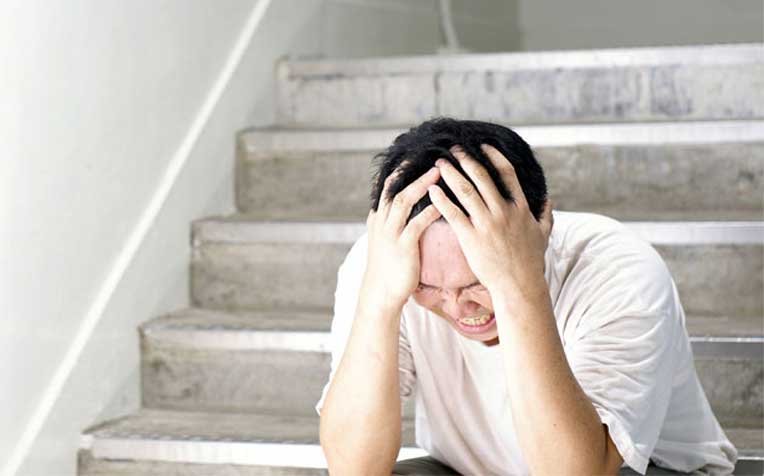
When anxiety starts to get out of control and disrupts your daily life, you should consult a doctor.
Feeling anxious is absolutely normal when you meet with a stressful situation, like going for an important meeting or taking a test. But what happens when the fretting and fear gets out of control?
“If this happens, you could be suffering from an anxiety disorder,” says Associate Professor Leslie Lim, Senior Consultant from the Department of Psychiatry at Singapore General Hospital (SGH), a member of the SingHealth group.
The term “anxiety disorders” refers to a range of mental conditions characterised by fearfulness, worry and uncertainty which interfere with the person’s life. These conditions include:
- Generalised anxiety disorder (GAD)
- Obsessive-compulsive disorder (OCD)
- Panic disorder with agoraphobia
- Post-traumatic stress disorder (PTSD) and
- Social phobia (or social anxiety disorder)
Are Singaporeans less prone to anxiety?
“About 10 per cent of the population in Singapore suffer from anxiety and depressive disorders. Out of this, six per cent have depression, 0.9 per cent have GAD, and three per cent have OCD,” says Assoc Prof Lim.
Interestingly, anxiety disorders seem less prevalent here than overseas. “In the United States, statistics have shown that 13 per cent of the population suffer from phobias. The figure is definitely not as high in Singapore,” observes Assoc Prof Lim. It’s the same for PTSDs. “Fortunately, tsunamis and earthquakes do not occur in Singapore, or PTSDs would be even more prevalent.”
| Anxiety disorder | What is it? |
|---|---|
| Generalised anxiety disorder (GAD) | Those with GAD worry excessively about health, money, family or work even if there is no reasonable cause. Symptoms include:
These symptoms are usually accompanied by headaches, muscle tension, irritability, sweating and fatigue. |
| Obsessive-compulsive disorder (OCD) | OCD is characterised by:
|
| Panic disorder | Panic disorder is characterised by sudden attacks of fear, usually accompanied by breathlessness, a choking sensation, shortness of breath, a pounding heart and fears of losing control or going crazy. It can occur anytime, even while watching television or sleeping, and typically lasts about 10-20 minutes each time. |
| Social phobia (social anxiety disorder) | Those with social phobia are excessively anxious and self-conscious in everyday social situations. They fear being watched and judged by others, and may be overly worried for days or weeks before a social event. Symptoms include profuse sweating, trembling, nausea and blushing. |
| Specific phobias | Phobias arouse an intense and irrational fear of something that may not actually be dangerous, such as animals, heights and thunder. Sometimes just thinking about the trigger brings on a panic attack. |
| Post-traumatic stress disorder (PTSD) | This condition is found in war veterans or survivors of natural disasters, victims of assault, rape and accidents or to an observer, such as someone who watched a loved one being harmed. Sufferers are easily startled, emotionally numbed, irritable or aggressive and experience frequent flashbacks. |
| Agoraphobia | Fear of enclosed spaces, e.g. buses, lifts, trains; fear of being trapped; fear of travelling away from home. |
Who is at risk of anxiety?
Women
People from the low socio-economic strata
Middle-aged persons
Anyone who has had negative life events such as relationship failures, job loss or the illness of a loved one
Those who are anxious by nature
When to seek help
In its mild form, an anxiety disorder will not affect normal life. “An office worker will still be able to step into the office, but he might be less productive than usual,” explains Assoc Prof Lim.
“Only severe forms of anxiety disorders can disrupt daily activities, making it impossible for the sufferer to go to work.”
If the anxiety is disruptive, you should consult a doctor.
“Your doctor will take some blood tests to rule out physical issues like hyperthyroidism, as well as use a diagnostic tool like an electrocardiogram (ECG) to exclude cardiac conditions.”
Is anxiety treatable?
Fortunately, anxiety disorders are highly treatable.
Depending on the specific type of anxiety disorder, doctors may prescribe several classes of medications (such as anti-depressants for GAD).
Psychotherapy can also help. This includes cognitive behaviour therapy which helps you to recognise and control your fears, modify your way of thinking, or desensitise you to anxiety triggers.
| Be free from fear |
|---|
Understanding how anxiety disorders work can help you to control the condition more effectively. In his book Freedom from Fear: Overcoming Anxiety Disorders, Dr Leslie Lim identifies the causes and characteristics of common anxiety disorders like generalised anxiety disorder (GAD), phobias and obsessive-compulsive disorder (OCD). Featuring concise and up-to-date treatment options, as well as useful lifestyle tips, it is a valuable resource for anyone who wants to overcome fear and anxiety and lead a happier life. Title available in English-paperback, English-ebook or Chinese. |
Ref: T12
Check out other articles on mental wellness:
Anxiety and Depression: When to Seek Help
How to Manage Anxiety and Depression
Contributed by

















 Get it on Google Play
Get it on Google Play